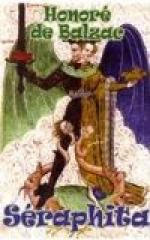After listening to Seraphita’s answer in which (being earnestly questioned) she unrolled before their eyes a Divine Perspective,—as an organ fills a church with sonorous sound and reveals a musical universe, its solemn tones rising to the loftiest arches and playing, like light, upon their foliated capitals,—Wilfrid returned to his own room, awed by the sight of a world in ruins, and on those ruins the brilliance of mysterious lights poured forth in torrents by the hand of a young girl. On the morrow he still thought of these things, but his awe was gone; he felt he was neither destroyed nor changed; his passions, his ideas awoke in full force, fresh and vigorous. He went to breakfast with Monsieur Becker and found the old man absorbed in the “Treatise on Incantations,” which he had searched since early morning to convince his guest that there was nothing unprecedented in all that they had seen and heard at the Swedish castle. With the childlike trustfulness of a true scholar he had folded down the pages in which Jean Wier related authentic facts which proved the possibility of the events that had happened the night before,—for to learned men an idea is a event, just as the greatest events often present no idea at all to them. By the time they had swallowed their fifth cup of tea, these philosophers had come to think the mysterious scene of the preceding evening wholly natural. The celestial truths to which they had listened were arguments susceptible of examination; Seraphita was a girl, more or less eloquent; allowance must be made for the charms of her voice, her seductive beauty, her fascinating motions, in short, for all those oratorical arts by which an actor puts a world of sentiment and thought into phrases which are often commonplace.




